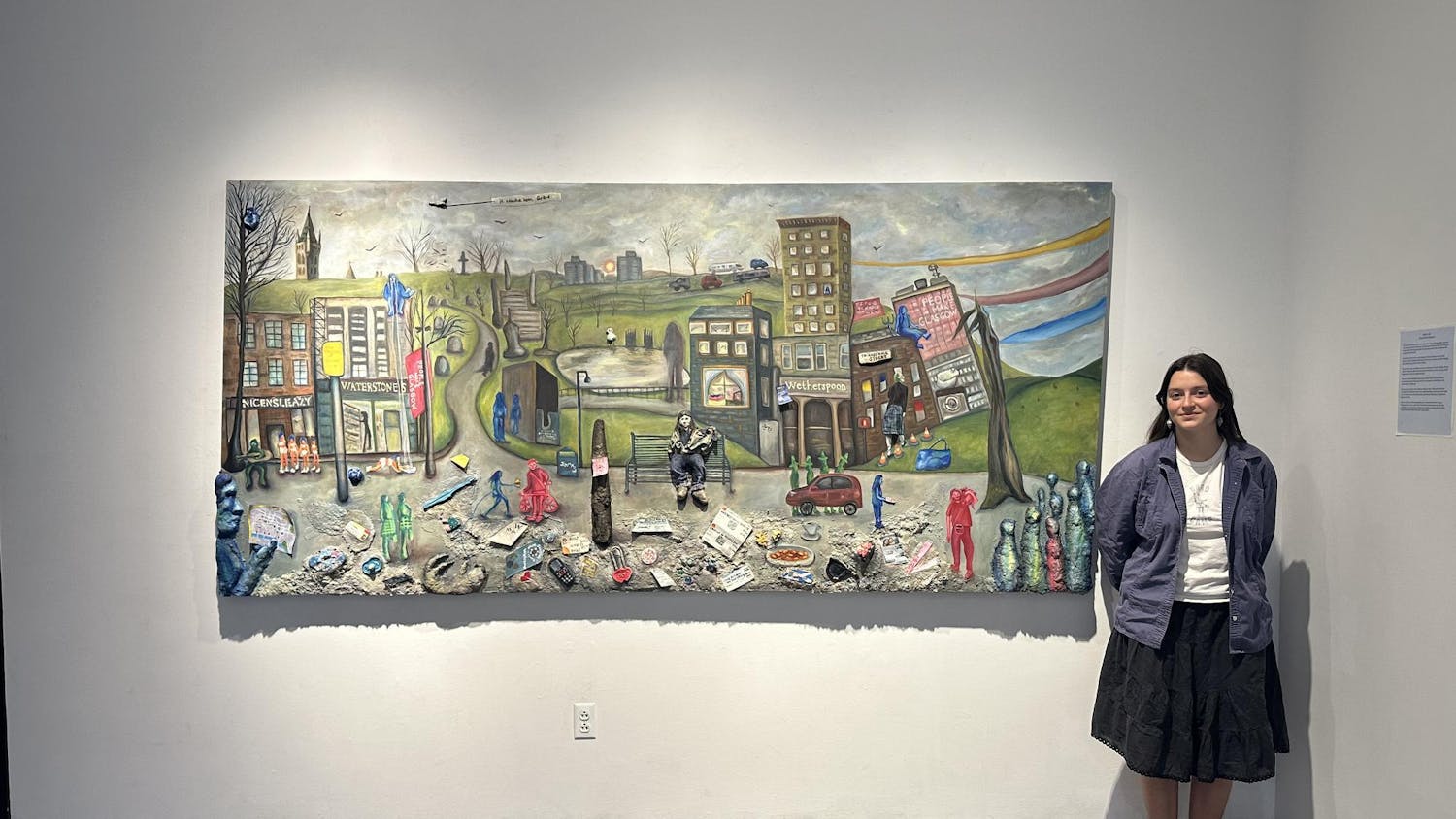Editor's note: A number of passages in the original version of this article presented as direct quotations language that differed from the wording used by the individuals quoted.
Corrections to the misquotations have been made below. Changes are made in italics, with parentheses indicating words that were erroneously included in the quotations in the original version of the article.
The Herald is committed to accuracy in its reporting and regrets the misquotations.
------
"Leavittsburg, Ohio," a new musical written by Nate Sloan '09 that premieres this Thursday in Brown's Stuart Theatre, brings more than a year of meetings, readings, rehearsals and late-night revisions to fruition. For Brownbrokers — the group that has produced student-written musicals at Brown for more than 70 years — "Leavittsburg" is the first new show since sweeping changes two years ago that brought more faculty involvement and department resources to the program.
Under the new system, each show spends a year in development and a year in production, said Aaron Malkin '10, a Brownbrokers board member and the assistant director for "Leavittsburg." Faculty members direct the shows instead of the student directors of past productions. In addition, the show's budget is considerably larger, said Mike Williams '10, a fellow board member and one of the musical's leads.
According to Malkin, the Brownbrokers board received four proposals for new shows last December. Of those four, two were chosen for further development: "Leavittsburg" and "Adding Up," by Sarah Kay '10 and Drew Nobile '07. Through collaboration between the writers, the Brownbrokers board, Professor of Theatre Arts and Performance Studies Lowry Marshall and Adjunct Lecturer in Theatre Arts and Performance Studies Andy Hertz, the proposals were transformed into two full-length musicals. These were then given staged readings in late spring. On the basis of those two readings, Malkin said, the board and the two faculty members chose "Leavittsburg" for the fall season.
"Leavittsburg" tells the story of a girl from rural Ohio who returns home for spring break during her first year at a prestigious university in New York City. She brings her boyfriend, an urban sophisticate, with her. Complications ensue.
"(The show is based on) personal experience(, but it's) greatly exaggerated," said Sloan, a New York City native who once traveled to Oklahoma with a girlfriend to meet her family.
As part of the new development process, Sloan worked closely with faculty mentors and the Brownbrokers board in developing the plot and the characters. Marshall said that the resulting changes ranged from the inclusion of a single joke to the addition of a chorus that brought the cast to 22 from an original six.
"(There was) never any(thing demanded), just suggested," Sloan said of the development process. "Invariably correct suggestions," he added.
"I don't (want) to say I feel blessed," Sloan said, "(but I really do feel I've been) very lucky (to work with such talented people.)"
Marshall, who is directing the show, was quick with praise for Sloan's collaborative skills.
"(He's) voracious in soliciting advice," Marshall said.
What's past is prologue
Many distinguished writers have come out of the Brownbrokers program. According to the Brownbrokers Web site, the group was founded in 1935 by Burt Shevelove, who went on to write "A Funny Thing Happened on the Way to the Forum." Other alumni include Alfred Uhry '58 (who wrote "Parade" and "Driving Miss Daisy") and David Yazbek '82, who composed scores for "Dirty Rotten Scoundrels" and "The Full Monty." A Brownbrokers show by Stephen Karam'02, "Emma," won the American College Theatre Festival's Best Musical Award in 2002 and was performed at the Kennedy Center in Washington, D.C. Karam's new play, "Speech and Debate," was the second most produced new play in America last year, according to Marshall.
According to John Emigh, professor emeritus of theater, the Brownbrokers program is highly unusual among Brown's peer schools. Student-written shows at Harvard, Columbia and other universities tend to be comic reviews with skits and songs, not full musicals.
"(It's) very uniquely Brown," said Williams.
But the Brownbrokers program also has what Emigh called "a checkered history."
As he put it, "Some got less than rave reviews, some got rave reviews and didn't deserve it," he said. "There have been wonderful shows."
"(Brownbrokers presented some lovely shows, but also many that got less than rave reviews — and still more that earned rave reviews they didn't deserve."
"(There was one show called) ‘Ugly and a Vegetable,'" he said. "I don't really know what it was about, but it had lots of puns in it."
Emigh described one year when the Brownbrokers board was left without a script. They performed a show by Woody Allen instead. Another year, they lacked a composer. So, Emigh said, they borrowed songs from "satiric songwriter" Tom Lehrer and stitched them together into a plot.
Professional musicals usually spend many years being workshopped and revised before they are ever produced. But the previous Brownbrokers program required students to write, develop and produce an original musical within a single calendar year — something Malkin called "a near-impossible task."
Marshall agreed, calling the process "frantic."
Along with the accelerated schedule, the old program paired student-written musicals with often inexperienced student directors. Writers attempting their first musical sometimes ended up working with first-time directors, Emigh said, which magnified the inherent challenges in producing new work.
"It (was) such a hard thing to ask of students, regardless of mentorship," Marshall said. "It was kinda cruel."
The entertaining Mr. Sloan
Sloan said he had benefitted enormously from the faculty guidance. When Sloan began writing "Leavittsburg," he had no experience in musical theater. His exposure to the Brownbrokers program came through a class in writing musicals Hertz offered last fall. Sloan said he had been a "musical theater geek" as a kid, but had abandoned it in high school. Although he was a music concentrator and had been composing for years, his only involvement in theater at Brown was as a musician in the pit.
Sloan's proposal was especially unusual in that he planned to write music, book and lyrics for "Leavittsburg." Marshall said most writers work in teams, with one responsible for music and the other for the words.
Last spring, after "Leavittsburg" was selected for production, Sloan graduated. He left Rhode Island to begin a doctoral program in Historical Musicality at Stanford just as the show got underway this fall. Malkin said that meant frequent phone calls and e-mails among Marshall, Malkin and Sloan, who also flew out for crucial periods like casting.
"It was crazy," Marshall said, adding that for the next show, they'd attempt to select a group of writers who'd still be at Brown during production.
But Dennis Kozee '10 and Ned Riseley '12, both actors in "Leavittsburg," said the excitement of working on a new show had outweighed the added stress.
"(There's a kind of) delightful uncertainty," Kozee said.
Williams said he valued the chance to shape the character he was playing.
"(I love the) circle of exchange between actor (and) writer," he said, even though that entailed a script still und
ergoing changes as the last week of rehearsals began. According to Marshall, two weeks before the premiere, Sloan added an entirely new scene to the second act.
"(I just want to say) sorry to all the cast members who had to keep waiting for music and dialogue," Sloan said, laughing.
But all difficulties aside, Sloan said he is now considering a career in musical theater.
"(This has been the) most thrilling experience of my life," he said.




